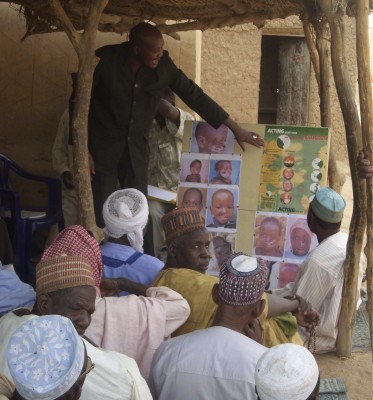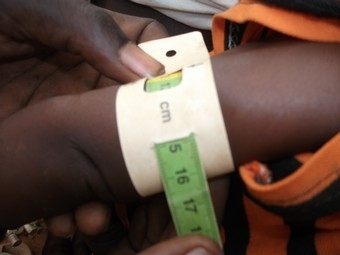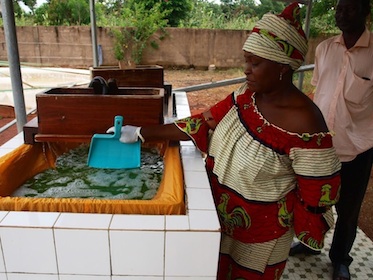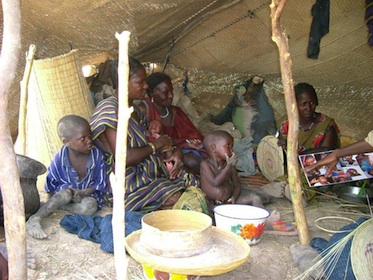- c/o Winds of Hope Foundation, Ch. de Montolivet 19, 1006 Lausanne, Suisse
- +41 (0)21 320 77 22
- info@nonoma.org
« Educating a child well is the work of the whole village ... » African proverb
Training

This involves training community health workers, medical staff, traditional practitioners and birth attendants in such a way as to have in each village a person trained in the prevention, detection and initial treatment of noma. The training takes place in trickle-down fashion, starting at national level and cascading down through regional and sub-regional levels. Training is provided in agreement or actual collaboration with the health authorities of each country.
- Health and social workers are trained in the prevention and management of gingivitis and/or noma and its risk factors.
- Traditional healers are trained in the detection and referral of cases of gingivitis and/or noma and their risk factors.
- Community contact persons are trained in child health monitoring, nutrition and community outreach in their respective villages.
- With the closest possible contact to mothers, there are often traditional birth attendants or matrons who are mostly illiterate and trained from mother to daughter.
Materials such as boxes of photos, posters about noma and its prevention, guides to prevention, training manuals, cassettes, toothpaste and toothbrushes are deposited with the various trained personnel, so that they can in turn pass on to others the best means of prevention.
Raising awareness and detection
This involves developing and implementing simple information and education programs for parents, especially mothers, to enable them to recognize the precursory signs of noma, provide the initial treatment needed to stop the disease, and fight the deep-seated belief in curses. Under this heading are activities such as:
- Radio programs, broadcast games for the public, theatre forums, film screenings, debates, and informative talks about prevention in villages in order to reach out to local communities, and especially to the illiterate.
- Organizing educational sessions for mothers in recovery centres, nutritional rehabilitation centres (CREN), local health outposts or elsewhere on topics such as malnutrition, birth spacing, hygiene and vaccination.
- Oral health education and prevention sessions in schools and orphanages, which serve notably to identify and refer cases requiring care to a health centre.
- Community outreach, involving film projections followed by discussion sessions, in schools, municipalities, public squares, community health outposts and any other places suggested by local authorities to raise awareness and inform people about oral hygiene, malnutrition and how to prevent noma and its consequences.
Primary care

Assisting primary health care services to support patients. Facilitating access to primary care for populations furthest away from health centers and for the most disadvantaged.
Ensuring that the necessary products – antiseptics, antibiotics and nutritional supplements – are available and accessible.
Providing support for treatment by taking charge of prescriptions issued locally by health workers.
Organizing free medical examinations in schools.
Humanitarian medical centres offering care to the most deprived populations virtually free of charge (CCMP).
Reception centres to deal with acute cases of noma (antibiotherapy, local care, rehydration, hypercalorific diet).
Free examination of children’s mouths for screening purposes.
Distribution to pregnant women of local products with high nutritional value, to prevent malnutrition.
The environment

« Malnutrition is not diminishing, quite the contrary. Since 2012 it has reached levels never seen before, which is worrying. » comments Dr. Quere of Médecins Sans Frontières (MSF) on the situation in Niger. Global warming, soil erosion, and insecurity (Boko Haram) are the main causes. It is now imperative for agencies at all different levels to tackle global poverty.
Fighting against malnutrition by implementing projects for the cultivation and distribution of spiraling.
Making nutritional supplements accessible (free distribution of enriched cereal bars or fortified porridge).
Distribution of spirulina to health workers during awareness sessions so that they can in turn distribute it to anaemic children or mothers.


